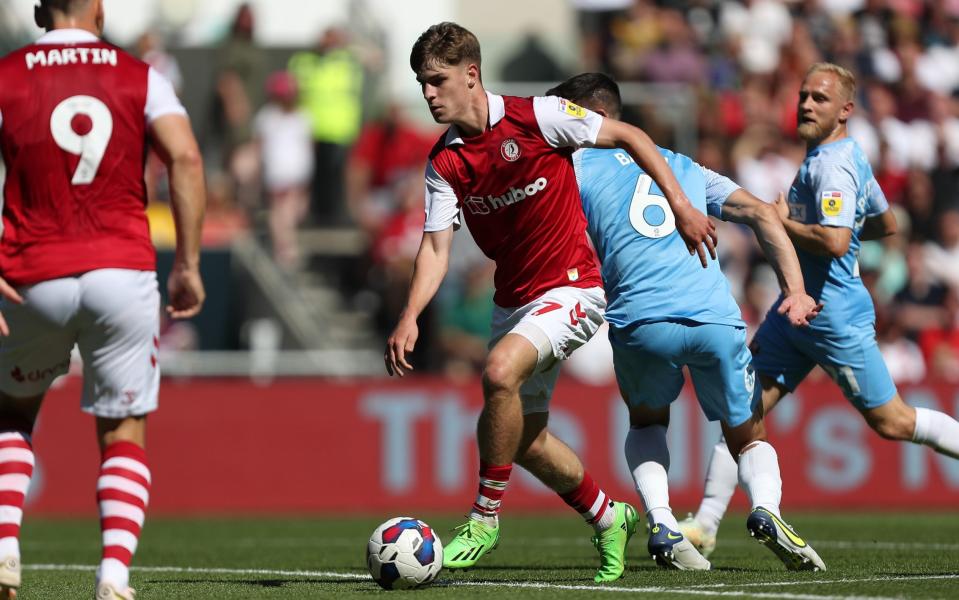Manchester United-linked Alex Scott shows his versatile best for Bristol City

With his lime green footwear and socks rolled down to his ankles, Bristol City’s Alex Scott quickly draws eyes. But grabbing attention is one thing; holding people’s gaze is another.
Following a 3-2 defeat to Sunderland on Saturday, Scott’s manager Nigel Pearson chastised the side’s defending. But they scored twice and led early in the second half and much of their forward thinking came via Scott.
Occupying a quasi No-10 role, in possession Scott had freedom to roam, while out of it he dropped onto the left-hand side of a midfield three. Nothing he did looked rushed. Everything he did looked comfortable, his first touch a given.
Where required, he dropped deep, happy to receive the ball in tight spots. From defensive corners, Scott was the out-ball, on one occasion drawing a foul that saw Dennis Cirkin booked.
There were glimmers of skill; the stepover; the shoulder drop; the drag. But never were they superfluous. Everything was calculated, with a view to creating an opening. If the first time pass was on, Scott made it. If the ball needed holding, he did so.
From just inside Sunderland territory, and with a break possible, Scott took a second. The crowd started to groan, but it was not hesitation: he was simply waiting for the overlap. The trigger was squeezed and a corner won.
When presented with space, Scott merrily drove forward, one run ending with a Chris Martin strike cleared off the line. A dart toward the six-yard box was almost rewarded, but the cross was just behind him.
Scott is a Guernsey lad, who spent time with both Southampton and AFC Bournemouth. Aged just 16 he debuted for Guernsey FC in the Isthmian League: “I know Alex was disappointed when Southampton released him,” says Guernsey manager Tony Vance. “I wouldn’t say lost his way but he needed to refind himself. Guernsey FC gave him that platform and he sprung into life very quickly.”
Within weeks Vance contacted City’s Player Pathway Manager, Brian Tinnion. A trial was arranged and Scott scored a ‘perfect’ hat-trick: “We’d been over to watch him and had seen footage, so we knew what he was about,” Tinnion recalls. “But when you see him live, you’re thinking ‘wow, he’s got some ability this boy.’ The decision to sign him was virtually made during that game.”
Scott moved to Bristol in January 2020, starting with the Under 18s. But he was not there long: “We thought ‘bloomin’ heck, he’s ready to go again,’” says Tinnion. “He was in the U23s really quickly and then the first-team asked about him. Nige [Pearson] loved him; he went at 17 and never came back.”
Le deuxième but de la saison pour la jeune pépite de 18 ans Alex Scott. Deuxième victoire en trois matchs pour Bristol City en Championship.pic.twitter.com/vjkOTdjVy4
— FR - EFL Championship (@freflchamp) December 6, 2021
A professional deal was penned in March 2021, and by August an extension to June 2025 was agreed. Scott’s rapid rise came as no surprise to Vance: “Nothing fazes him. Wherever he is playing, he’ll still try the same things, and invariably they will come off. He step-ups every time.”
Like many young players, versatility has been beneficial to Scott. He has played in holding midfield, behind the strikers and at wing-back. “As he matures, I think he’ll be a central midfield player who can be either a four or an eight,” explains Tinnion. “He can be the one that takes it off the back and link the play, or he can attack and create in the final third.”
This summer, Scott helped England secure the European Under-19 Championships, scoring a headed equaliser off the bench against Italy in the semi-final, before starting the 3-1 extra-time final victory over Israel.
England through to the #UEFAU19 final, coming from behind to beat Italy 2-1 thanks to two headers from corners. Here's the first from Bristol City's Alex Scott. Final is on Friday night #YoungLionspic.twitter.com/OW0JfdnK8b
— Gary Taphouse (@garytaphouse) June 28, 2022
Intriguingly, Scott was one of just three players in Ian Foster’s 21-strong squad not to be with a top-flight club. His midfield partner in the final, Carney Chukwuemeka, recently joined Chelsea from Aston Villa for an eye-catching £20 million, and Scott has been linked with Manchester United and Tottenham Hotspur.
But Chukweumeka played just 301 league minutes last season, while across the top-four divisions, of those ages 18 and under, only Callum Doyle played more than Scott’s 2,750 minutes.
And those minutes should only rise. Scott has started the first two matches, with a small but significant indicator of his importance at Ashton Gate being his squad number; 36 has been replaced by seven.
“Playing time is the key,” says Tinnion, who describes Scott as a student of the game. “That’s where you get your experience, that’s where you learn the game, that’s where you get your ups and downs.” City fans are hoping Scott thinks likewise.

 Yahoo Movies
Yahoo Movies 